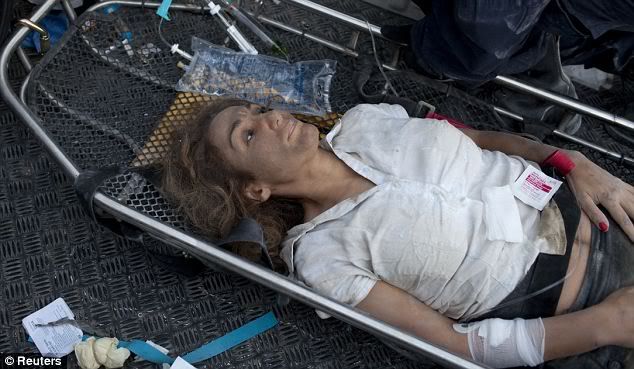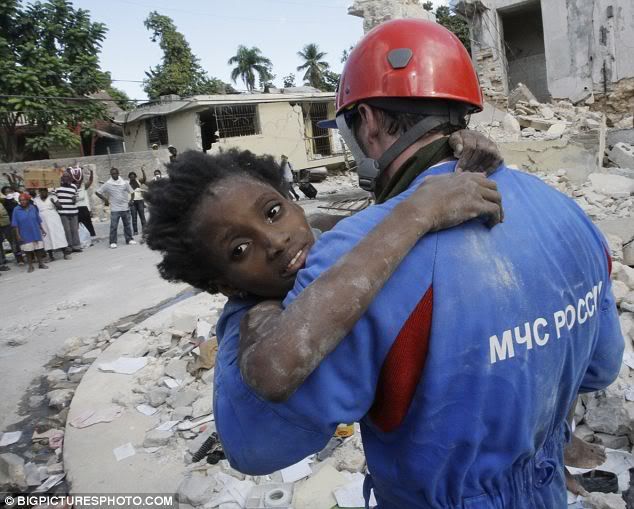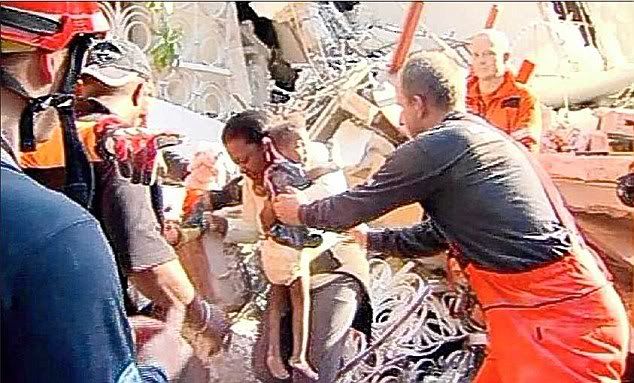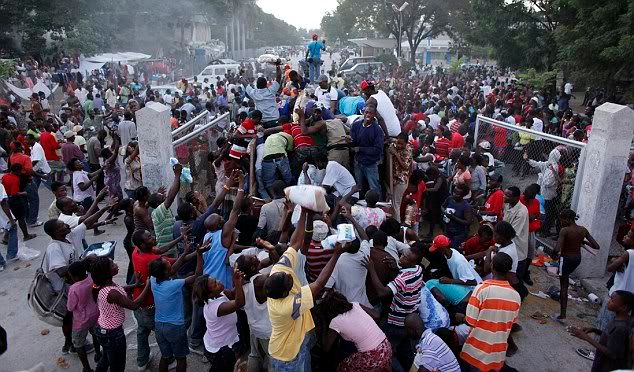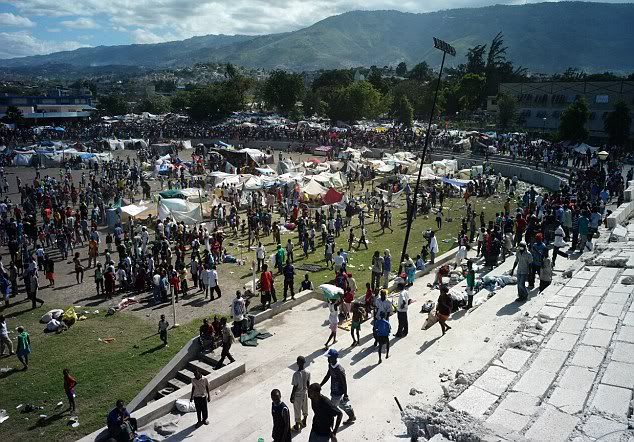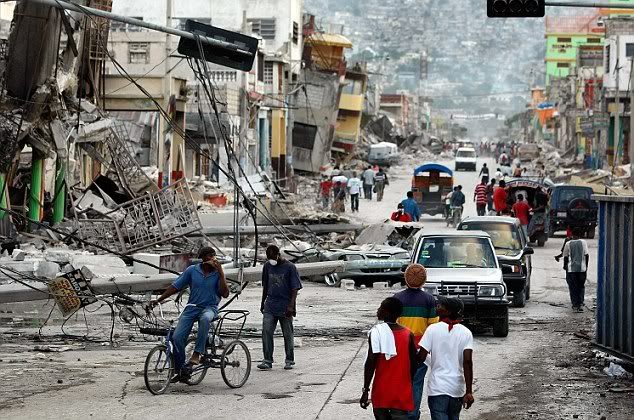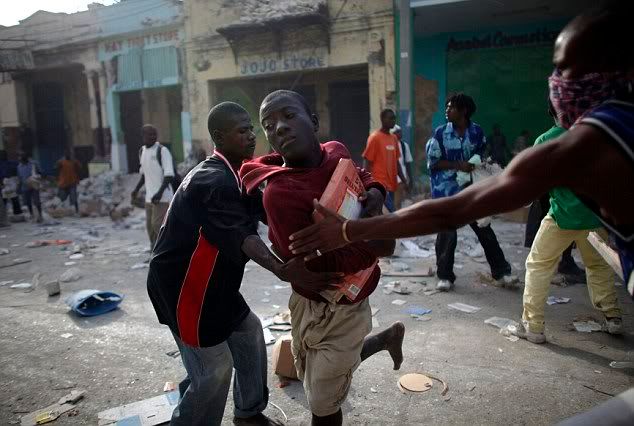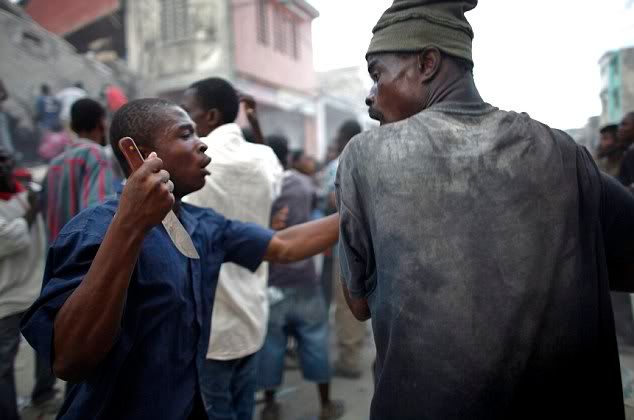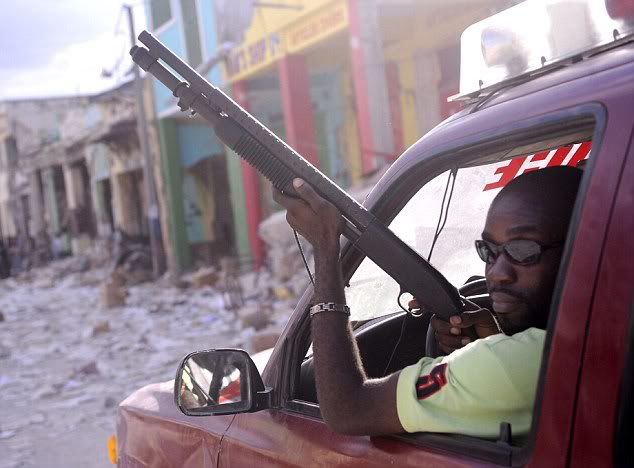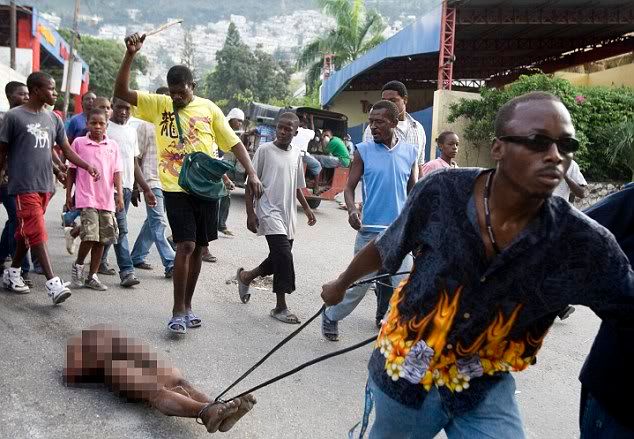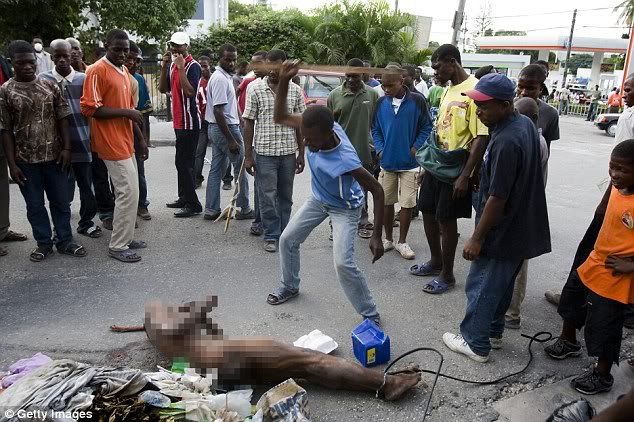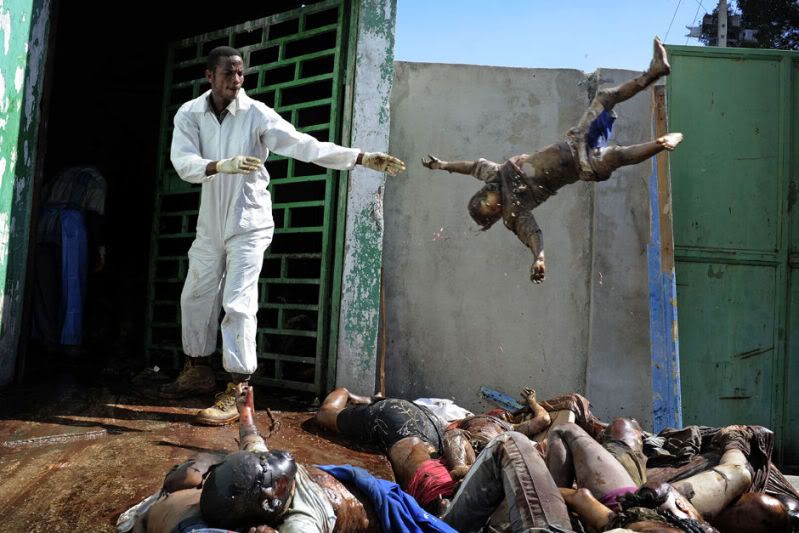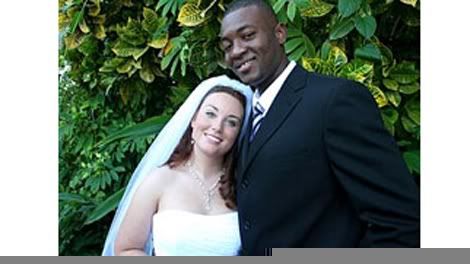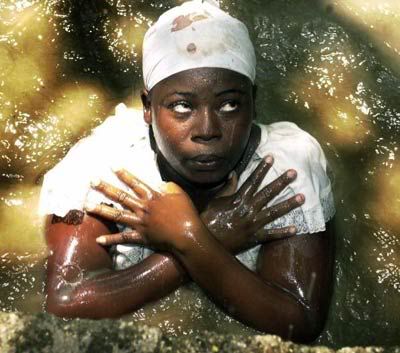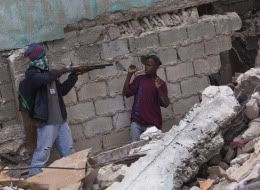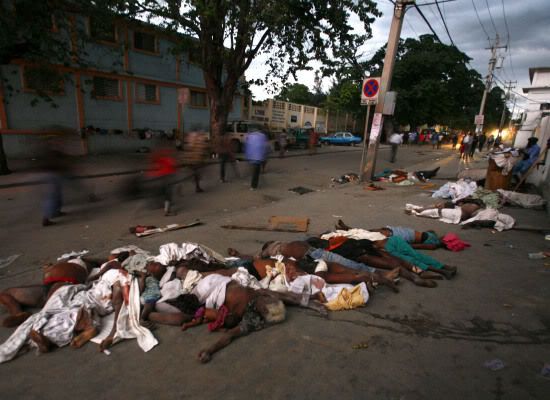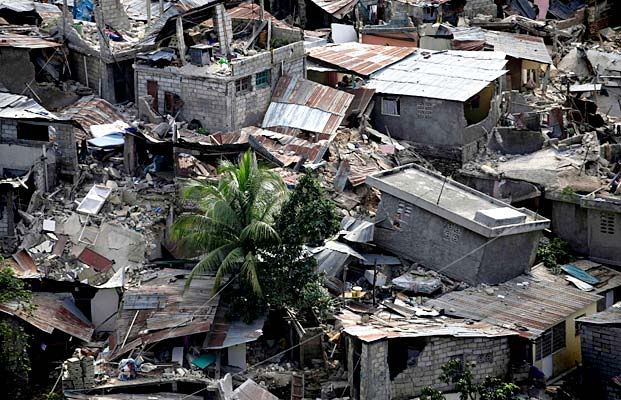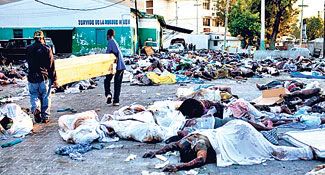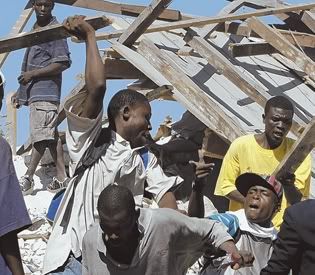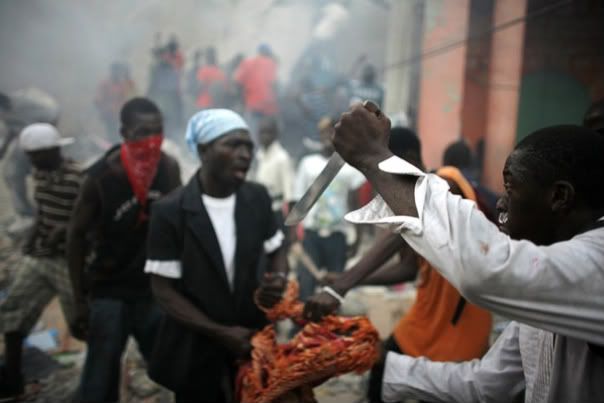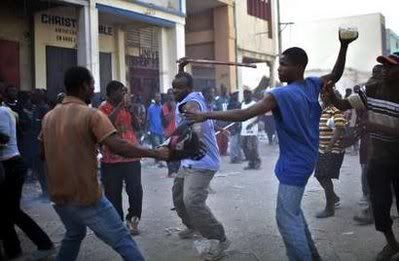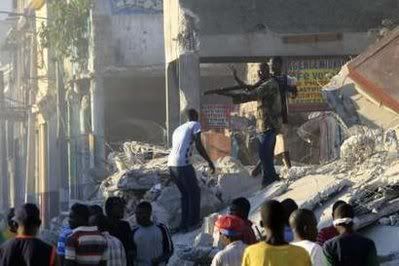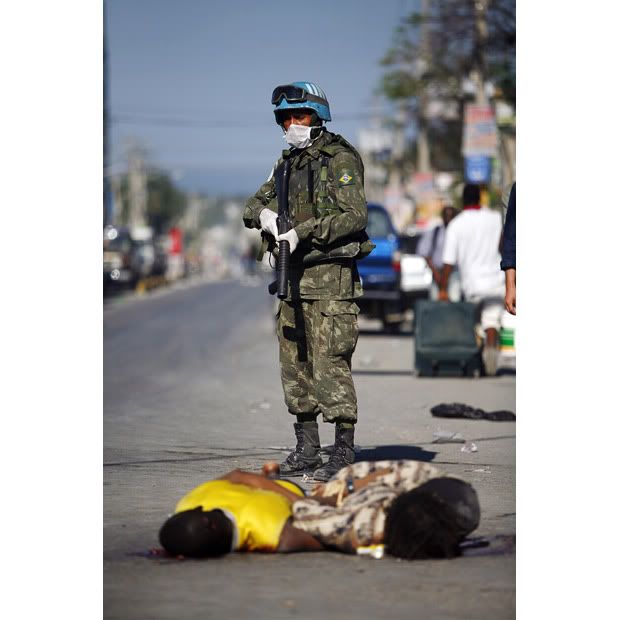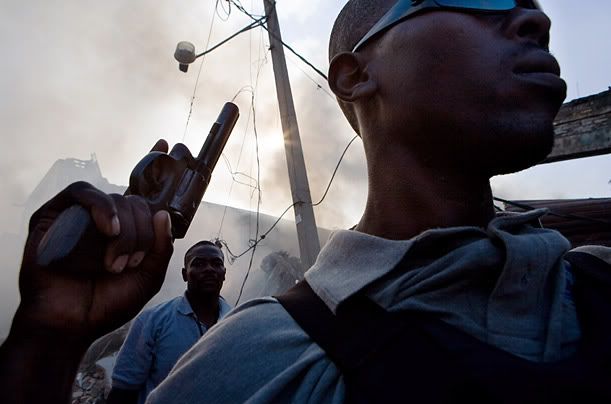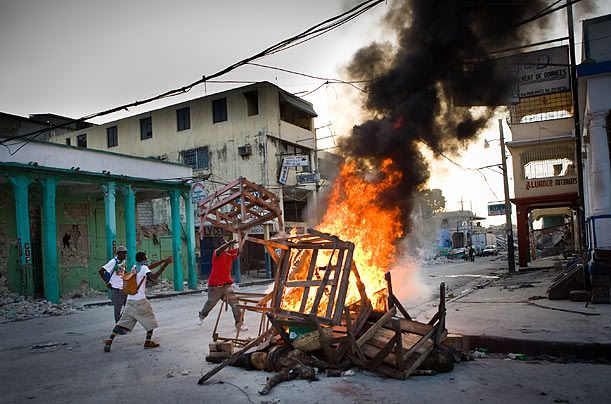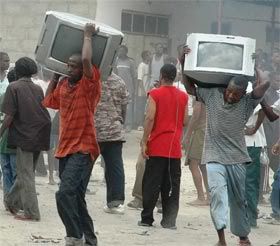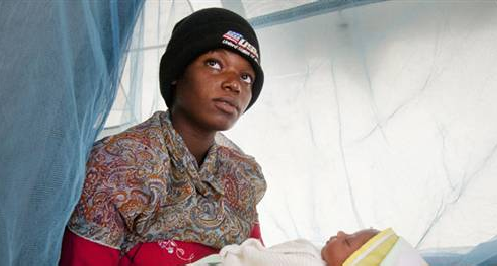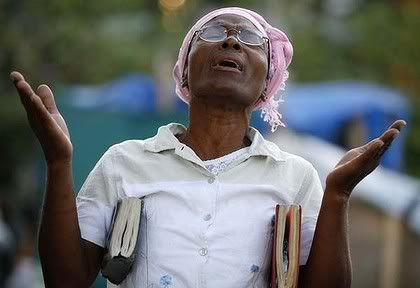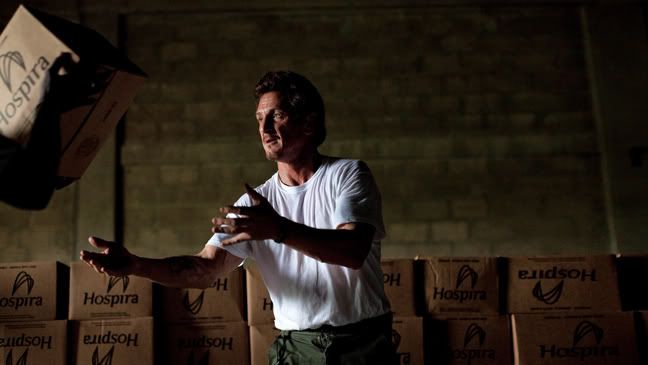One year later, we must not forget.
Women in Haiti’s Squalid Refugee Camps Face Rampant Rape
One year after a devastating earthquake hit Haiti, women and girls staying in the country's refugee camps live without adequate food, water, shelter and medical care. And when the darkness falls, the rapists come.
According to a report from Amnesty International, precarious living conditions and a lack of security in and around the camps have left thousands of women and girls as young as two vulnerable to sexual predators. Many of these women lost their family and community connections in the quake along with all of their worldly possessions.
One widow named Guerline was forced to watch her 13-year-old daughter being gang raped by four men. "They told me that if I talked about it, they would kill me," she told researchers. "They said that if I went to the police, they would shoot me dead." That same night, Guerline was raped as well.
The Commission of Women Victims for Victims, a women's group run by and for rape survivors from the poorest areas of Port-au-Prince, registered 230 cases of sexual assault in 15 camps during the five months after the Jan. 12 quake. There are over 500 camps in the Haitian capital.
The vast majority of the women living in the camps who were interviewed reported being raped by two or more individuals. Most of those assaults occurred at night and by men who were armed.
Rapes are rarely reported to authorities because of the shame, social stigma and fear of reprisals from attackers, USA Today reported. The few brave women who have come forward to file a report with authorities were told that nothing could be done for them. Some police officers even demanded bribes to investigate the assaults, but the victims had no money.
Rape victims are also emotionally, spiritually and physically scarred by their attackers. Some become pregnant, suffer internal injuries or contract sexually transmitted diseases. Haiti has the highest infection rate for HIV in the Western hemisphere, with one in 50 people infected, The Associated Press reported.
In an effort to stem the tide of sexual assaults in Haiti's refugee camps, human rights groups are urging the government and charitable organizations to improve lighting and security in the camps, increase the number of private bathing facilities and make a serious effort to prosecute rapists. Additional tents, a more visible police presence, self-defense courses and better information about medical treatment options are also suggested.
<object width="640" height="385"><param name="movie" value="http://www.youtube.com/v/Y8xb94sfIEQ?fs=1&hl=en_US"></param><param name="allowFullScreen" value="true"></param><param name="allowscriptaccess" value="always"></param><embed src="http://www.youtube.com/v/Y8xb94sfIEQ?fs=1&hl=en_US" type="application/x-shockwave-flash" allowscriptaccess="always" allowfullscreen="true" width="640" height="385"></embed></object>
http://news.yahoo.com/s/yblog_spoin...aitis-squalid-refugee-camps-face-rampant-rape
Children of Rape Are Latest Legacy of Haiti Quake
A year after Haiti’s devastating earthquake, women in Haiti’s still-teeming tent cities face yet another threat: sexual violence. With little protection from community or law enforcement, many have been violently raped, only to become pregnant with their attackers’ children.
Photojournalist Nadav Neuhaus traveled through Haiti’s tent cities last summer, photographing and interviewing dozens of residents in the camps that still house more than 1 million people. During a visit to Camp La Piste, home to 50,000 displaced people, Neuhaus noticed an unusually high number of pregnant women. A community organizer and a local midwife confirmed his worries: Many of the women were pregnant as a result of rape.
They came to Camp La Piste after losing parents, brothers and husbands in the earthquake, leaving them to fend for themselves in the sprawling squalor, where roving gangs of armed men terrorize residents.
In a new report, Amnesty International documents the rise in sexual violence, including at least 250 rapes reported in the first few months after the earthquake.
Fueled in part by these sexual attacks, the birth rate in Haiti has tripled since the quake, climbing from 4 percent to 12 percent, according to population experts.
Most women told Neuhaus they don’t report the rapes, either out of shame or fear of repercussions. Even if they wanted to report the crimes, there's little help in a country where police and justice systems are destroyed or distracted and where resources for the powerless are almost non-existent.
http://www.msnbc.msn.com/id/40930866/ns/health
Mobs Lynch 'Witches' in Haiti For Spreading Cholera Epidemic
PORT-AU-PRINCE: Haitian mobs fearing a cholera epidemic have killed people whom they had accused of trying to spread the disease, including through witchcraft, police say.
''A dozen people accused of importing cholera to a region that so far has been spared were killed with machetes and stones and their corpses were burned in the streets,'' a police inspector said.
A prosecutor, Kesner Numa, said: ''These people are accused of witchcraft related to cholera.'' The attackers believed the victims were trying to ''plant a substance that spreads the disease in the region''.
Advertisement: Story continues below
The first lynching cases took place last week. ''Since then we have had cases every day,'' the prosecutor said.
Communities in the Grand Anse region in the far south-west of Haiti were refusing to co-operate with investigations into the killings.
''They really believe that witches are taking advantage of the cholera epidemic to kill.'' It was not immediately clear if any of the victims had cholera.
Six people were hacked or stoned to death in the town of Chambellan and five others in Marfranc and Dame Marie, officials said.
According to journalists, at least three people were killed by mobs in the city of Jeremie, while several others were killed under similar circumstances in surrounding villages.
Health authorities say Grand Anse is the region least affected by the cholera epidemic, which has killed 1817 in Haiti since mid-October. Only five of those deaths have been reported in Grand Anse.
About half of Haiti's population is believed to practise the voodoo religion in some form, although many are thought to also follow other religious beliefs at the same time.
http://www.smh.com.au/world/mobs-ly...preading-cholera-epidemic-20101203-18jv0.html
Love in the Time of Cholera
One year after the devastating Jan. 12 earthquake, how Sean Penn, Paul Haggis, Maria Bello and their friends are still fighting for Haiti’s survival amid unspeakable horror.
It’s Christmas Eve in Haiti, and while the rest of the world is slowing down, Sean Penn is speeding up.
His fingers gripped tight on the handrail of a mud-splattered SUV, gulping cigarette smoke like oxygen, he’s wiry, intense, haggard, his hooded eyes alert to every move, emotions clenched tight as a fist, as his car lurches through a hilly slum, ironically named Bel Air. PHOTOS: Sean Penn's Haiti home.
Half-naked children clamber around the crumbling shacks. A family stews food on the porch of a building stamped with red letters, meaning it’s destined for demolition — only the place is still here, and so is the family.
It’s a bad set designer’s version of the apocalypse, except that it’s real — especially for Penn, 50, who’s been a fixture in Haiti since moving here almost immediately after the Jan. 12, 2010, earthquake that threw the country into chaos, and the actor’s own life, too.
“There’s a great thing Paul Newman said about his long marriage,” he says wryly. “ ‘As it turns out, we still love each other.’ That’s how I feel: ‘As it turns out, I’m still here.’ ”
He cracks a rare smile as we approach a small, newly erected school for about 300 children. Penn is here to meet its founder, a Haitian-American event producer funding the endeavor from his New York base who’s come to see the result, his exquisite Tunisian girlfriend in tow.
An enigmatic businessman. A 6-foot model. A school that’s open on Christmas Eve. It’s enough to make anyone wary, let alone the genetically cautious Penn.
“He wants us to contribute what we’ve got, a heavy-equipment team and a civil engineer,” he says. “But I don’t know. There’s a lot of people, and you don’t know where they’re coming from.”
Given this, it’s hardly a surprise that Penn holds back when the man, Unik Ernest, greets him warmly and leads him into the rough-and-tumble building. As we make our way through crevice-like hallways, he shows us a giant bowl of rice that provides these kids with one solid meal per day — a miracle in this impoverished town — and ushers us into a cramped classroom where nearly 50 children squeal with delight at seeing Penn.
Not Penn the actor: Penn the humanist. Penn the leader of a camp that houses 55,000 displaced persons. Penn the man whose rubble-busting machinery might turn this squalor into something bordering on the human.
One by one, the girls line up to kiss him. If Penn hesitates — he’s hardly the kiss-and-cuddle type, and cholera is a clear and present danger — he kisses them on the cheek nonetheless, with a disarming gentleness.
Then the girls sing: “We wish you a merry Christmas. We wish you a merry Christmas. We wish you a merry Christmas and a happy new year!”
http://www.hollywoodreporter.com/news/love-time-cholera-67824
